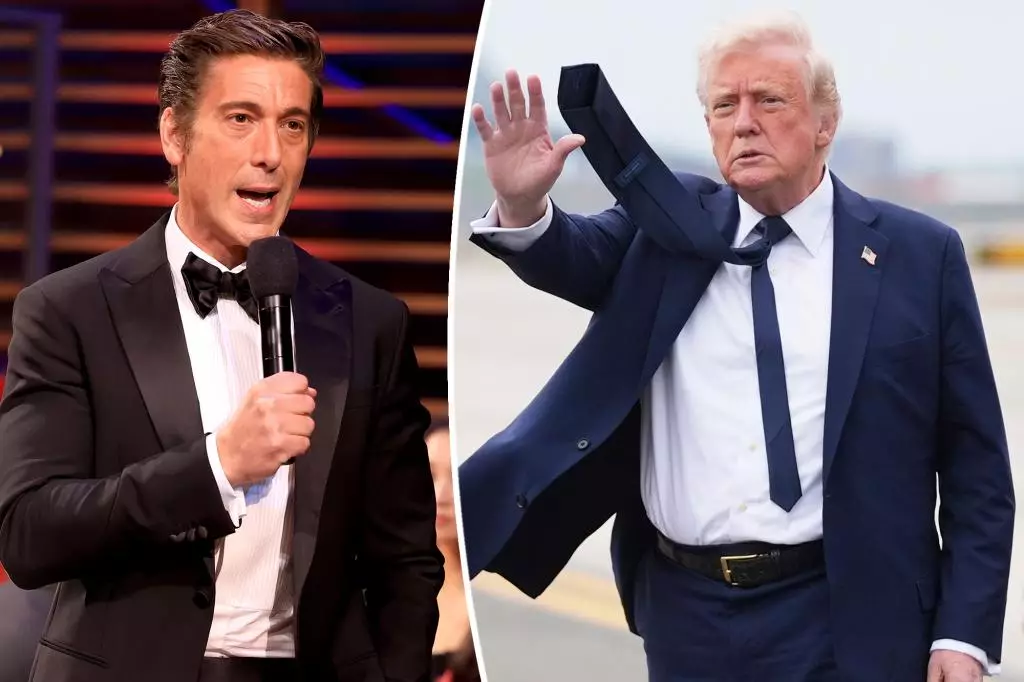In a striking revelation, ABC News is set to air a significant interview with the President of the United States, marking the pivotal milestone of his first 100 days in office. However, the decision to sidestep its star journalists, David Muir and George Stephanopoulos, in favor of senior national correspondent Terry Moran underscores the complex interplay between media and politics. It unveils a stark reality where personal dynamics and past grievances may hinder the essential practice of journalism, forcing news organizations to reconsider who gets to represent them in pivotal moments of public discourse.
A Battlefield of PR and Personal Grudges
This shift to an under-the-radar correspondent raises eyebrows, and understandably so. Trump’s history with Muir and Stephanopoulos is anything but cordial. The animosity reportedly stems from a contentious debate in September last year, during which Muir and his colleague were accused of failing to challenge the Democratic nominee adequately, showcasing a bias that Trump was quick to capitalize on. This criticism spiraled into personal insults, including accusations of Muir being “not legit” and “a lightweight.” Such hostility paints a vivid picture of how deeply personal perceptions can intertwine with professional responsibilities.
Moreover, Trump’s discontent escalated post-election when he suggested legal action against Muir while disparaging his journalistic integrity and personal appearance—an utterly unusual combination of judgment rooted more in personal conflicts than in factual reporting. This situation begs the question: how can serious journalism survive amid such a charged atmosphere of personal scrutiny?
Choosing the Voice of Authority
By opting for Terry Moran, ABC appears to be attempting to divorce itself from the drama that accompanies Trump’s interactions with Muir and Stephanopoulos. While some may argue that this decision serves a pragmatic purpose—aiming for a diplomatic dialogue without the baggage of prior confrontations—others lament the missed opportunity. Muir’s years at the forefront of ABC’s news presentation undeniably grant him a level of recognition that Moran lacks, potentially limiting the interview’s impact in drawing viewership.
To delegate such a crucial conversation to a lesser-known correspondent raises fundamental inquiries about the ramifications of public trust. Will viewers perceive this as an act of avoidance, thus undermining ABC’s commitment to vigorous journalism? A primetime interview with the President should warrant voice and visibility reflective of the gravitas of the moment, and a more familiar journalist might have elevated this high-stakes moment in American media history.
The Fallout of Media and Presidential Relations
The landscape of media relations with the presidency has reached a peculiar crossroads where mutual respect seems absent. ABC News finds itself caught between the necessity of presenting significant news and navigating the contentious relationship with Trump. Critics argue that this could signal a downward trend in political journalism where favoritism shapes coverage, transforming straightforward interviews into a strategic game of public relations.
Furthermore, the recent defamation lawsuit resolution, involving remarks made by Stephanopoulos regarding E. Jean Carroll’s case, adds another layer of complexity to this already tumultuous relationship. The convergence of personal conflict and the legalities of media speech creates an environment where journalism might dampen its critical lens, ultimately impacting the broader narrative surrounding the legitimacy of political discourse in America.
As we delve deeper into the fabric of this unfolding drama, one cannot ignore the repercussions of sidelining the pillars of authority in journalism. In an era of information overload where credibility is paramount, what soil does one plant their roots in if fear of personal repercussions weeds out the very foundations of inquiry and transparency? The choices made today could echo for years, influencing how presidential actions are questioned and discussed.

